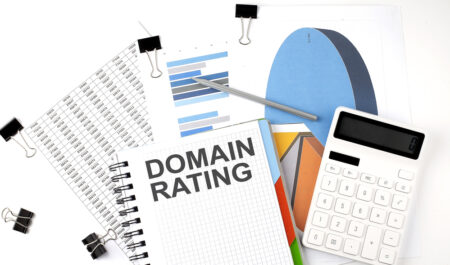If you have a website and monitor its progress, you have probably heard about Domain Rating (DR) and Domain Authority (DA) before.
But do you know what these terms mean? And do they affect where your site ranks on the Search Engine Results Page (SERP)?
Domain Rating and Domain Authority are closely related metrics with the same goal. They will give you insight into how likely your site will rank on top of search engines like Google and Bing.

However, the problem with these metrics is that they often give conflicting
results because they measure different things and use other criteria to rank your website.
Read on to learn what these critical SEO metrics mean and how you can use them to improve your site’s ranking on Google.
What is Domain Rating?
Domain Rating is a proprietary ranking metric developed by Ahrefs that predicts how well a website will perform in search engine results pages (SERPs). It is based on many factors related to a website’s backlink profile, including link popularity and quality.
DR ranges from 0 to 100 — with higher ratings indicating a more remarkable ability to rank in SERPs, while a lower rating means your website is more likely to be buried in SERPs.

Domain rating is an important metric to track, as it can give insights into a website’s link-building progress and overall SEO health. However, it is worth mentioning that DR has no direct impact on a page’s Google ranking.
High DR websites are likelier to rank high on SERPs since they also fare well in Google’s ranking algorithms (correlation, not causation).
Ahrefs’ website authority checker is the best tool for checking DR — or how strong a website is in terms of its backlink profile. Type your website’s URL and press the Check website authority button. You may be asked to enter a CAPTCHA.
What is Domain Authority?
Domain Authority is a search engine ranking score developed by Moz that predicts how well a website will rank on SERPs. Moz calculates your DA score based on various parameters, including the linking root domains, the quantity and quality of inbound and outbound links, and domain age.

A DA score ranges from 1 to 100, with higher scores corresponding to a more remarkable ability to rank. Because DA merely indicates a site’s ranking potential, achieving a very high DA score should not be your primary objective. It would be best only to use DA to approximate your SERP rankings.
You can use Moz’s free domain SEO analysis tool to check your website’s DA. Input your website’s URL and hit the Analyze Domain button. The first metric you will see is the Domain Authority score.
Difference Between Domain Rating and Domain Authority
Domain Rating and Domain Authority are often used in the SEO world. They both represent a website’s potential to rank in SERPs but are not quite the same.
DR is based on the number of unique links pointing to a domain. It does not consider factors such as domain age, traffic, or if the website contains spam links. On the other hand, DA is based on the number of links pointing to individual pages on a domain.
In other words, DR measures the strength of a website’s backlink profile, whereas DA measures the ranking ability of individual pages on a domain.
How To Increase Domain Rating?
You can do a few key things to increase your Domain Rating. One is to get unique do-follow links for your website. This means that when other websites link to yours, they are giving you a vote of confidence that helps boost your ranking.
Remember that links from a high DR website will have a much more significant impact on your DR score than links from a low DR website. Therefore, avoid spam backlinks, as they can damage the Domain Rating of your website and hurt your chances of ranking high in SERPs.
Instead, focus on building high-quality backlinks from authoritative websites. This will help improve your Domain Rating and show search engines that your site is trustworthy. You must also ensure the backlinks you are getting are pointing toward the relevant pages of your website.
You can also improve your Domain Rating by ensuring your website content is well-written and informative so other sites want to link to it.
You could also approach high-DR websites and request they link to your pages. Keep in mind, however, that it is not just about getting links from high DR websites — it is also important to have links from a variety of websites with different levels of DR.
How To Increase Domain Authority?
Moz considers many factors to calculate the DA of a website. The most important of these are link equity and brand signals.
Link equity (or “link juice”) is the raw power that links pass, and it is calculated based on the number and quality of links pointing to a site. Moz’s Link Explorer web index provides the link data used to calculate DA scores. Brand signals are harder to define, but they essentially reflect how well-known and trusted a site is. When calculating DA, Moz also looks at other factors like on-page optimization and user engagement.
To improve your DA score, you should try to improve your site’s overall SEO health, with a particular focus on getting unique, high-authority backlinks from high DA websites.
You must also avoid spammy links. If you have a strong backlink profile, you will likely see an increase in your Domain Authority over time.
Conclusion
In terms of SEO, both Domain Authority and Domain Rating are essential metrics in their own right. However, using these metrics as sole ranking factors could be a mistake. It helps to see the other side of the equation, as these metrics can help you create effective linking strategies and measure your SEO efforts.



